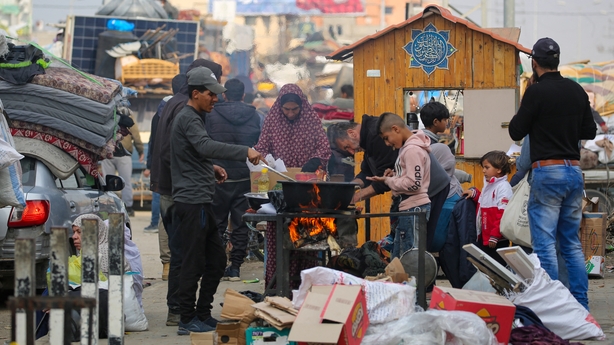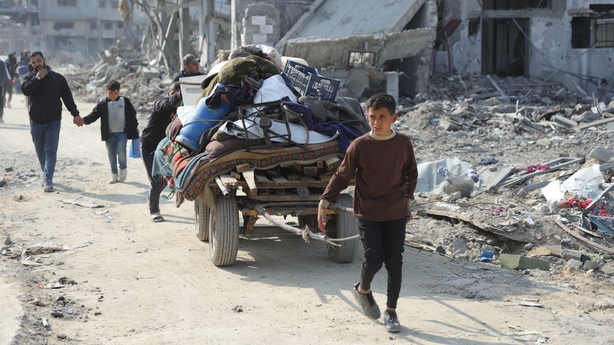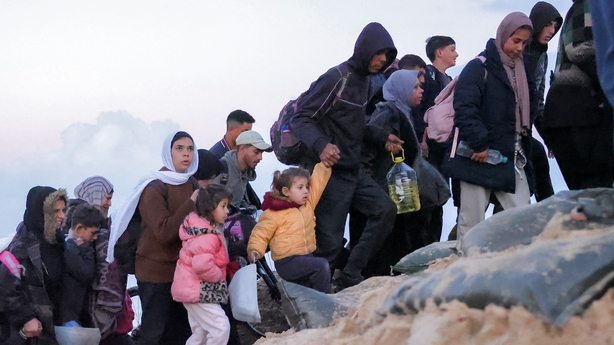Columns of Palestinians carrying what belongings they could are heading to north Gaza for a second straight day, after Israel permitted their passage in accordance with an ongoing ceasefire.
"I'm happy to be back at my home," said Saif Al-Din Qazaat, who returned to northern Gaza but had to sleep in a tent next to the ruins of his house.
"I kept a fire burning all night near the kids to keep them warm... (They) slept peacefully despite the cold but we don't have enough blankets," the 41-year-old said.
Yesterday, Israel allowed hundreds of thousands of displaced Gazans to return to their homes in the north.
Although the crowds had thinned somewhat by today, thousands of men, women, and children were still seen heading north, fully aware they had little waiting for them but the rubble of their homes.
In central Gaza's Nuseirat refugee camp, children waved at Egyptian soldiers manning checkpoints along the route as vehicles laden with mattresses, bags and other belongings made their way north.
For many, the journey marked not just a return home but a confrontation with the harsh realities of more than 15 months of war in the densely populated territory of 2.4 million people.

Mona Abu Aathra managed to travel from central Gaza to Gaza City, though she has yet to assess the full extent of the war's impact on her home.
Her hometown, Beit Hanoun, was among the areas hardest hit by a months-long Israeli military operation which continued right up to this month's ceasefire.
"We returned to Gaza City with nothing, and there's no drinking water. Most streets are still blocked by the rubble of destroyed homes," the 20-year-old said.
Despite the devastation, Abu Aathra expressed relief at being reunited with her family. "It's the first night we're together again, me, my mother and my father. Last night, we gathered with my three brothers who were here in Gaza City."
'We will rebuild our homes'
The Hamas government press office said 300,000 people returned north on the first day of returns yesterday. The UN Office for the Coordination of Humanitarian Affairs (OCHA) put the figure at 200,000.
The returns had been due to begin on Saturday, but Israel delayed the start, accusing Hamas of reneging on the terms of the ceasefire by failing to include woman civilian Arbel Yehud among the Israeli hostages released at the weekend.
After Hamas agreed to release Ms Yehud and two other hostages by Friday, Israel opened the corridor on Monday morning.
Mahmoud Kashko, who had decided not to return north yesterday, said he had been swept up in the collective momentum today.
"I was hesitant to return to Gaza City, but when I saw hundreds of thousands of people coming back, I decided to return," he said.
"I arrived at my home today. Of course, it's destroyed like most people's homes."
Others were still waiting to see how the ceasefire unfolds.
Another Gaza City resident, Hamouda al-Amsi, explained that his younger brother Amer and his family decided to remain in their tent at a displacement camp in the south.
"They don't want to return to Gaza City yet because there are no houses, tents, water or food there," Amsi said. "It's the same across the territory - there are no basic necessities for life."
Although aid deliveries have increased since the ceasefire began, the territory's needs remain overwhelming. The World Food Programme said it distributed more food in the first four days of the ceasefire than in the entire month of December.

But OCHA said that those returning north would need other essential supplies too, like drinking water, shelter equipment and hygiene kits.
Amsi refused to be put off. "We will rebuild our homes, and life will return to how it was before (the Hamas attack of) 7 October 7 (2023)," he said confidently.
Displacement of Gazans would be 'unacceptable' - France
France has said that any forced displacement of Gazans would be "unacceptable" after US President Donald Trump proposed moving them to Egypt and Jordan.
"Any forced displacement of the population in Gaza would be unacceptable," a French foreign ministry spokesman said when asked about Mr Trump's comments.
Mr Trump reiterated his desire to move Palestinians from Gaza to "safer" locations such as Egypt or Jordan, and said he would meet with Israeli Prime Minister Benjamin Netanyahu in Washington "very soon".
The president last week floated the idea to "clean out" Gaza after more than 15 months of war between Israel and Hamas had reduced the Palestinian territory to a "demolition site".
Asked about those comments, Mr Trump told reporters on Air Force One he would "like to get them living in an area where they can live without disruption and revolution and violence so much".
"You know, when you look at the Gaza Strip, it's been hell for so many years... there's always been violence associated with it," he said.
When pressed on what that would mean for a two-state solution, he said he would be meeting with Mr Netanyahu "in the not too distant future".
"He's coming here to meet with me," he said.

Mr Trump has also held talks in recent days with Jordan's King Abdullah II and Egyptian President Abdel Fattah al-Sisi, who have historically opposed displacing Palestinians.
"I wish he would take some," Mr Trump said of the Egyptian leader.
"We helped them a lot, and I'm sure he'd help us."
"As they say, it's a rough neighborhood, but I think he would do it, and I think the king of Jordan would do it too," he added.
Almost all of Gaza's 2.4 million inhabitants have been displaced by the war provoked by Hamas's attack on Israel on 7 October 2023.
A ceasefire underway is due to last six weeks, allowing the release of 33 hostages held in Gaza against some 1,900 Palestinian prisoners.
Read the latest Middle East stories
During this first phase, the terms of the second phase are to be negotiated, with the aim of freeing the last hostages and bringing the war to a definitive end.
The final stage will involve the reconstruction of Gaza and the return of the bodies of the last hostages who died in captivity.
Former president Joe Biden's administration drew up a series of plans for the post-war period in Gaza, but Mr Trump has so far made no mention of them.
We need your consent to load this rte-player contentWe use rte-player to manage extra content that can set cookies on your device and collect data about your activity. Please review their details and accept them to load the content.Manage Preferences

